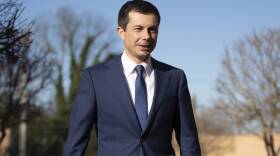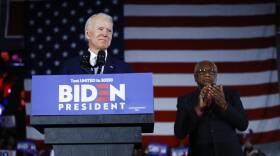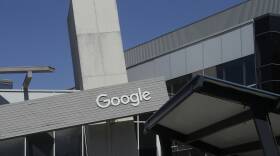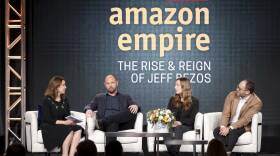EXPLORE MORE
Coming up Friday on BPR, live from the BPL:
Media maven Sue O'Connell
Live Music Friday: husband and wife musicians Will Nelson Jr. & Loren Benn
Boston University media researcher Joan Donovan
Love Letters columnist Meredith Goldstein
Recent segments
-
Sue O'Connell On Pete Buttigieg's Historic Run For President
"It's important as we celebrate Pete Buttigieg's success," she said. -
Callie Crossley: Why Southern Black Voters Saved Biden
Black voters in southern states live within the history of discrimination, Crossley said, and will do everything they can to continue racial progress. -
Andy Ihnatko: Tech Industry Conferences Canceled Due To Coronavirus
Google and Facebook are among the companies canceling annual events over concerns about coronavirus. -
Cabral: Schumer Did Not Threaten Supreme Court Judges
On Thursday, Sen. Chuck Schumer was rebuked by both Senate Majority Leader Mitch McConnell and Chief Justice John Roberts for comments he made about Supreme Court Justices Brett Kavanaugh and Neil Gorsuch. The comments were made on Wednesday when Schumer addressed a pro-choice rally held outside the court. -
Annie Linskey On Elizabeth Warren Dropping Out
On Thursday, Warren announced that she would suspend her campaign for president. -
‘Frontline’ Director James Jacoby Talks ‘Amazon Empire’
Jacoby called the film, which follows the life and career of Jeff Bezos, “the everything story."
Listen to previous shows
-

BPR Full Show: Out in Space
Today on Boston Public Radio: We begin the show by talking with listeners about the latest news from the Jan. 6 committee hearings. Art Caplan talks about California Gov. Gavin Newsom announcing that the state would begin manufacturing its own insulin. Caplan is the Drs. William F. and Virginia Connolly Mitty Professor and founding head of the Division of Medical Ethics at NYU School of Medicine in New York City. Juliette Kayyem shares her analysis on the latest news from the Jan. 6 committee hearings, and the release of surveillance video footage depicting the police response to the Uvalde school shooting. Kayyem is an analyst for CNN, former assistant secretary at the Department of Homeland Security and faculty chair of the Homeland Security program at Harvard University’s Kennedy School of Government. Corby Kummer weighs in on the end of the business lunch, and explained how some online restaurant reviews seemingly from customers are part of an extortion scam. Kummer is executive director of the food and society policy program at the Aspen Institute, a senior editor at The Atlantic and a senior lecturer at the Tufts Friedman School of Nutrition Science and Policy. Lee Feinberg and Terri Randall discuss the NOVA documentary “Ultimate Space Telescope,” and previewed what’s next for the James Webb Space Telescope. Feinberg is the Optical Telescope Element Manager for the James Webb Space Telescope at the NASA Goddard Space Flight Center. Randall is the director of the new NOVA documentary “Ultimate Space Telescope,” which airs on PBS, GBH2, on July 13 at 9 p.m. EST. Eric Deggans shares his thoughts on this year’s Emmy nominations. Deggans is NPR’s TV critic and author of the book “Race-Baiter: How the Media Wields Dangerous Words to Divide a Nation.” We end the show by opening phone lines, asking listeners for their thoughts on images taken by the James Webb Space Telescope. -

Corby Kummer: "Straight up extortion"
Some restaurants have begun receiving one-star reviews — but not from people who have ever visited the venue. Food writer Corby Kummer joined Boston Public Radio to explain this new extortion scheme is affecting restaurants. “After a series of mysterious one star reviews, they [restauranteurs] get a letter from India saying, ‘$75 gift card, please, if you want these reviews to come down,’” Kummer said. “It’s straight up extortion.” Kummer explained that Google is taking down reviews in some cases, but in other situations Google rules the review legitimate. “I think the solution is for Google to improve its system and figure out how to monitor when these things are happening,” Kummer said. “They say that they've got guardrails in place, but in this case, they're not working. It's a new scam.” Kummer is executive director of the Food and Society policy program at the Aspen Institute, a senior editor at The Atlantic and a senior lecturer at the Tufts Friedman School of Nutrition Science and Policy. -

BPR Full Show: Jan. 6 Hearings Continue
Today on Boston Public Radio: We begin the show by asking listeners if they’re persuaded by the deals of Amazon Prime Day. Trenni Kusnierek talks about the fourth straight championship win for the Boston Renegades, Simone Biles and Megan Rapinoe receiving the Presidential Medal of Honor, and Condoleezza Rice’s recent buy-in to the Broncos. Kusnierek is a reporter and anchor for NBC Sports Boston, and a weekly Boston Public Radio contributor. Carol Rose discusses the direction the Supreme Court is moving in, and its impact on democracy, particularly concerning an impending decision about gerrymandering. Rose is the executive director of the ACLU of Massachusetts. Andrea Cabral shares some insights about what to expect in the upcoming Jan. 6 hearing, including the ways that former President Donald Trump incited white supremacist groups throughout his election and presidency, and the potential for his prosecution. Cabral is the former Suffolk County sheriff and secretary of public safety, and former CEO of the cannabis company Ascend. We end the show by turning to coverage of the Jan. 6 hearings. -

BPR Full Show: How to forage mushrooms
Today on Boston Public Radio: We begin the show by asking listeners if President Joe Biden should run for a second term, or if not, who should replace him. Charlie Sennott shares his thoughts about Biden’s upcoming trip to Saudi Arabia, Boris Johnson’s resignation and the assassination of former Japanese Prime Minister Shinzo Abe. Sennott is a news analyst for GBH, where he also heads up the GroundTruth Project. Adam Chandler discusses the ways that start-ups can be market disruptors and the destruction they sometimes leave in their wake, including ghost kitchens, grocery delivery services and ride share companies, particularly given the fallout from Uber’s recent leak. Chandler is a journalist and author based in New York, and a former staff writer at The Atlantic. Tyler Akabane talks about his new store, The Mushroom Shop, discusses the cultural moment that mushrooms are having and shares his foraging recommendations. Akabane is the founder and owner of The Mushroom Shop, a specialty mushroom shop in Somerville. Then we ask listeners whether they buy into mushroom mania. Revs. Irene Monroe and Emmett Price weigh in on the corrupt politics of the Supreme Court in the context of their recent landmark decisions, as well as recent calls to serve a dormant warrant about lies told in Emmett Till’s trial. Monroe is a syndicated religion columnist and the Boston voice for Detour’s African American Heritage Trail. Price is founding pastor of Community of Love Christian Fellowship in Allston, and the Inaugural Dean of Africana Studies at Berklee College of Music. Together they host the “All Rev’d Up” podcast. Nick Quah shares his top podcast recommendations right now, including Stitcher, Rococo Punch and Room Tone’s “Welcome to Provincetown'', hosted by Mitra Kaboli, season 7 of Slate’s show “Slow Burn,” hosted by Susan Matthews, and the most recent installment of Pineapple Street Studios’ The 11th, called “His Saturn Returns.” Quah is Vulture’s podcast critic. We end the show by asking listeners whether they’d go on a cruise in a COVID world. -

BPR Full Show: Porchfest!
Michael Curry shares his thoughts about Boston's proposed tax rebate plan, the law enforcement responses to local white nationalism, a recent budget increase for the city's COVID-19 response and health care struggles facing people of color in the commonwealth. Curry is chair of the NAACP Advocacy and Policy Committee, and is president and CEO of the Mass League of Community Health Centers. Jim Aloisi and Stacy Thompson talk about the state of the MBTA: recent derailments, budget concerns and sources of political inaction, as well as Boston’s upcoming open street days and bike lane controversy. Aloisi is the former Massachusetts transportation secretary, a member of the Transit Matters board and contributor to Commonwealth Magazine. Thompson is executive director of Livable Streets. Andy Ihnatko discusses new privacy settings for users of Apple products at sensitive locations as well as the rise and controversies of AI-generated art. Ihnatko is a tech writer and blogger, posting at Ihnatko.com Then, we ask listeners about whether they prefer to keep or get rid of their old, sentimental clutter Marie Fukuda and Red Shaydez talk about the upcoming Fenway Porchfest, including their roles in organizing and curating it. Fukuda is an arts advocate and member of the Boston Cultural Council. Shaydez is a rapper, community leader and artist in the commonwealth. We end the show by hearing music from Fenway Porchfest performers Jobe Freeman, Mar Fayos and International Show.









